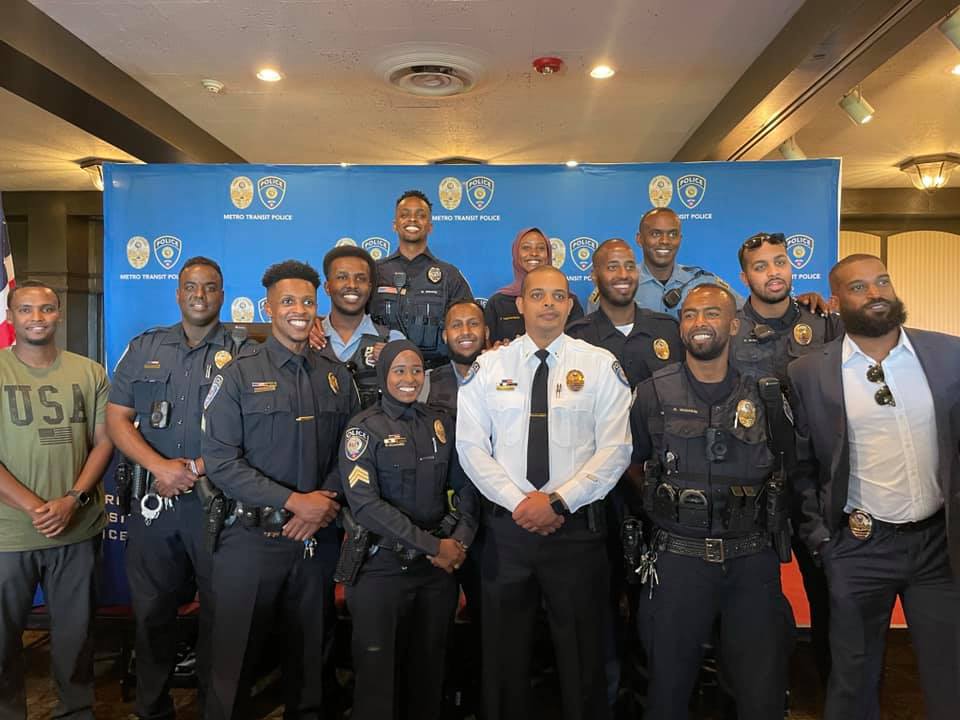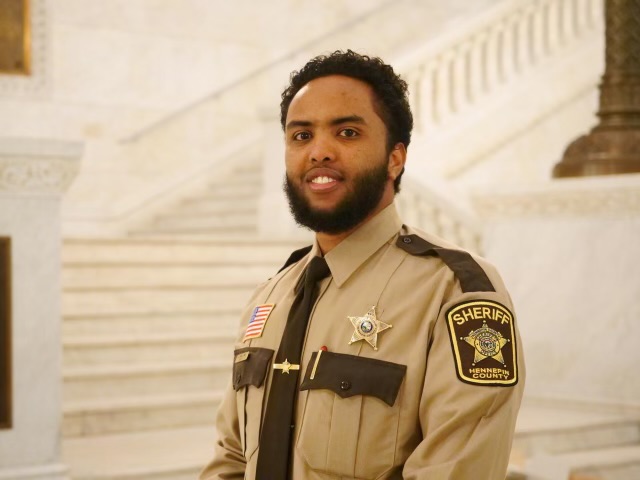Somali Americans – the latest immigrant group to find a calling in local law enforcement.
The cliché example of the Irish cop has some company in Minnesota.
For decades early 20th century Irish immigrants were a driving force in local law enforcement ranks, dominating many east coast departments such as New York and Boston PD’s, and adding to the ranks of Minnesota’s law enforcement community. It was an honest job that offered the Irish a path towards legitimacy and inclusion in American culture and the American dream. Theirs is a rich history in American law enforcement, and we are all better for it.
Locally, the Emerald Society was formed in 1992 by a group of Irish peace officers as a charitable organization to support local law enforcement and Irish charities. The Emerald Society’s Minnesota Pipe Band is a poignant presence at all fallen officer’s funerals in the state. Read more about the Emerald Society and Irish peace officers here.
In the late 1970s, the end of the Vietnam war led many Hmong who had fought alongside the U.S. to immigrate to the U.S., many to Minnesota. In the early 1980s, like the Irish before them, Hmong began to join the ranks of local law enforcement. In 2008, due in no small part to the sizable number of Hmong officers, the Minnesota Asian Police Officer’s Association (MAPOA) was formed to support and foster relationships between the Asian community and local law enforcement. Read more about MAPOA here. It is estimated that there are 95,000 Hmong Minnesotans, with over 100 Hmong peace officers serving in law enforcement agencies across the state.
In the 1980s and ’90s, unrest in Somalia resulted in many Somalis immigrating to the U.S., and a sizable proportion of those immigrants came to Minnesota. It is believed as many as 80,000 Somalis call Minnesota home today. Just as previous immigrant groups did, Somalis began joining the ranks of local law enforcement in the early 2000s. Today it is estimated that over 50 Somalis serve in the ranks of Minnesota law enforcement, and we are better for it.
In 2012 the Somali American Police Association (SAPA) was formed to support and mentor Somali peace officers and students, as well as help bridge the gap between the Somali community and local law enforcement. Learn more about SAPA here.

I had the pleasure of working with one of Minnesota’s Somali peace officers before I retired from the Hennepin County Sheriff’s Office. Deputy Ahmed Awl now serves as the President of SAPA, and I had a chance to catch up with him recently. His story is inspiring and represents the epitome of the American dream.

Ahmed was born 29 years ago in Somalia. His family lived a traditional nomadic lifestyle, raising camels for trade and traveling in the countryside. They raised and sold their camels in exchange for food and other goods, never dealing in currency. They had no electricity, few forms of communication beyond a portable radio, no power tools or motors, and no formal education, with the exception of homeschool-styled studying of the Quran, and an occasional visit by a traveling mathematics tutor.
Ahmed rarely saw a car as a child and remembers occasionally looking at an airplane flying miles overhead and not being able to comprehend how there could possibly be people in such a small thing.
It is hard to believe the changes in Ahmed’s life over a short period of time.
When Ahmed was 11, his parents decided to try to find a better future for their children. They traveled across the border into Ethiopia and found their way to Addis Ababa. They eventually made contact with an international aid organization that was willing to sponsor Ahmed to immigrate to the U.S.
When Ahmed turned 13, he left his parents and siblings and immigrated to St. Louis Park, Minnesota with other family members. He didn’t speak any English but began learning by playing soccer throughout the summer. In the fall he began the 8th grade and attended every tutoring class he could to move forward. Through his hard work, he was able to graduate from St. Louis Park High School in 2013.
During driver education classes in high school, a Minnesota State Trooper came to his class for a day of discussion. Ahmed was enthralled by the Trooper and the job he got to do for a living. He knew that day what his calling was.
Ahmed went on to Minnesota State in Mankato where he graduated with a bachelor’s degree in criminal justice studies in 2017. He then moved on to complete his POST Skills law enforcement training and enrolled at St. Scholastica to begin his master’s degree in business administration (which he completed in 2019).
In 2019 he had applications into several law enforcement agencies and was poised to start work with the St. Paul PD when then-Hennepin County Sheriff Dave Hutchinson called him. Sheriff Hutchinson asked Ahmed to give the county a chance, and the personal call changed Ahmed’s mind and the course of his career. Ahmed has worked in a variety of divisions within the sheriff’s office — jail, courts, community engagement, and now patrol — and he couldn’t be more pleased with his career choice.
In 2022, Ahmed was elected by his Somali officer peers to serve as the President of the Somali American Police Association. According to Ahmed, SAPA represents nearly all the Somali peace officers who serve in the U.S. There are currently 56 members nationwide, 48 of them in Minnesota — which speaks to the groundbreaking nature of Minnesota’s Somali police participation. SAPA also has 13 international Somali peace officers in its membership. The first female Somali officer in the United States, who is employed by the Metro Transit Police Department, serves as SAPA’s Vice President.
SAPA has played an important role in helping foster and mentor Somali officers and those interested in entering the profession. SAPA has developed relationships with area schools, Minnesota’s POST skills courses, as well as law enforcement leaders throughout the country. These relationships have helped break down barriers and open opportunities for more Somalis to serve. Ahmed points to the fact that Somali culture is socially conservative and supportive of law and order. Law enforcement careers represent a natural fit for many. In fact, Ahmed’s younger brother recently joined him in the ranks of the Hennepin County Sheriff’s Office.
I found throughout my 33-year career that a cop is a cop — no matter the race, religious affiliation, gender, etc. It always gave me hope for our future.
As with immigrant groups that came before them, Somalis who care about the future of their new home are increasingly gravitating towards careers in local law enforcement. It’s a natural evolution that will improve our collective community and one that conservatives would be wise to learn more about, support, and foster.